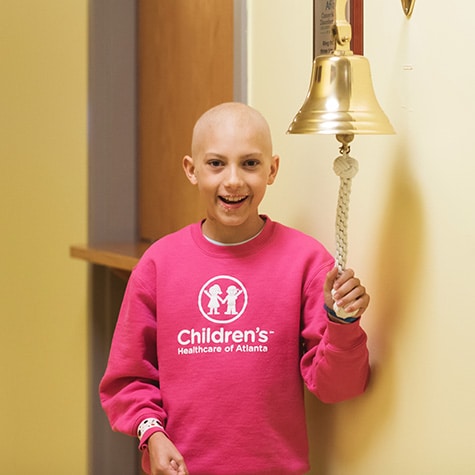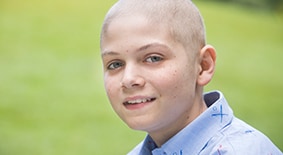Dakota Refuses to Let a Brain Tumor Get in the Way of Her Dreams
A brain tumor is impacting Dakota’s sight and requires constant monitoring and prolonged treatment. Yet she remains focused on acting, singing and her future as a mermaid.

Molly and Chris Southerland were heartbroken when they learned that their “miracle child,” Dakota, had an inoperable brain tumor. The 9-year-old had complained about her vision being blurry when she was in class, but Molly wasn’t worried until the symptoms persisted. After several weeks, Molly decided to schedule a checkup with her daughter’s pediatrician.
Her doctor suggested Dakota see an ophthalmologist after noticing that she had double vision. When Dakota failed all of the ophthalmologist’s eye exams, she was then referred to Children’s Healthcare of Atlanta for an MRI.
Bravely pushing through
This imaging test revealed that Dakota’s vision problems were being caused by juvenile pilocytic astrocytoma (JPA), a rare childhood brain tumor. Her tumor was located in both parts of the thalamus, which relays motor and sensory signals to the cerebral cortex, and was pushing on her optic nerve.
Because surgery was not an option, Dakota had to have chemotherapy treatments at the Aflac Cancer and Blood Disorders Center of Children’s every week for a full year to help shrink the tumor. “It’s been a struggle,” Molly admits. “And Dakota is still struggling with double vision in both eyes and blurriness in her left eye.”
Dakota also developed some anxiety regarding her treatment regimen. “She beat herself up because she felt like it was her fault,” Molly says. “We tell her that we don’t know why she got the tumor, but God has a big plan for her, and we are going to follow this plan to get better.”
Slow and steady path forward
The visits for treatment slowly got better and more comfortable for Dakota thanks to support from Children’s staff who eased her anxiety and came to her side during treatment when needed. “Just watching her go through this with a smile on her face most of the time and always being so happy, she’s my hero,” Molly says. “She’s her daddy’s hero too, and we always tell her that.”
Dakota’s brain tumor is a chronic illness, so it will need to be monitored every three months moving forward, making sure it doesn’t grow and put her at risk for cognitive problems. However, as she continues to live with this complex cancer, there’s no better team to have by Dakota’s side than the skilled providers at the Aflac Cancer and Blood Disorders Center, home to one of the largest brain tumor programs in the country.
Today, Dakota is the same outgoing, spunky little girl who loves acting, drawing and singing. She was excited to return to school and start fourth grade and has set her sights on becoming a marine biologist—or maybe a mermaid—one day.

One of the largest centers for pediatric cancer in the U.S.
No parent wants to hear the word “cancer"—but with our team by their side, patients and families can rest assured that they are receiving the full spectrum of advanced therapies available to treat these complex diseases.
See HowMaking a Difference for Kids With Cancer
Contact Us 404-785-1112


